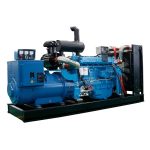Introduction
Diesel generators play a crucial role in providing backup power in various industries, institutions, and residential settings. While these generators are known for their robustness and reliability, they face unique challenges when operating in low-temperature environments. In this article, we will explore the factors that affect the performance of diesel generators in cold conditions and discuss the strategies and technologies that can be employed to optimize their efficiency and reliability in such environments.
Understanding the Challenges of Low-Temperature Operation
Operating diesel generators in low-temperature environments presents a range of challenges that can impact their performance and longevity. One of the primary issues faced by diesel generators in cold weather is the impact of low ambient temperatures on the engine's combustion process. Diesel engines rely on compression ignition, where the air-fuel mixture is compressed until it reaches a temperature high enough to ignite the fuel. In cold conditions, achieving the required temperature for combustion becomes more challenging, leading to issues such as hard starting, reduced power output, and increased fuel consumption.
Cold temperatures also affect the viscosity of the diesel fuel, making it thicker and harder to atomize, which can result in incomplete combustion and increased emissions. Additionally, low temperatures can lead to issues such as fuel gelling, which occurs when the paraffin wax in the diesel fuel solidifies and clogs fuel filters and lines, disrupting the fuel supply to the engine.
600kw generator when operating diesel generators in cold environments is the impact of freezing temperatures on the generator's components and systems. Cold weather can cause fluids such as engine oil and coolant to thicken, affecting their ability to lubricate and cool the engine effectively. Furthermore, low temperatures can lead to the contraction of metal components, increasing the risk of mechanical failures and malfunctions.
Strategies for Optimizing Diesel Generator Performance in Cold Weather
To ensure the reliable operation of diesel generators in low-temperature conditions, it is essential to implement various strategies and technologies that address the challenges mentioned above. Below are some key approaches to optimizing the performance of diesel generators in cold weather:
1. Cold-Weather Fuel Additives: Using cold-weather fuel additives can help prevent fuel gelling and improve the flow characteristics of diesel fuel in low temperatures. These additives contain anti-gel agents that lower the fuel's pour point and inhibit the formation of wax crystals, ensuring smooth fuel delivery to the engine.
2. Block Heaters: Installing block heaters on diesel engines can help preheat the engine block and improve cold-starting performance. Block heaters maintain the engine at a suitable temperature, reducing wear and tear on components and minimizing the energy required to start the engine in cold weather.
3. Battery Heaters: Cold temperatures can significantly reduce the cranking power of batteries, making it challenging to start diesel generators. Battery heaters can help maintain the battery's temperature and ensure reliable starting performance, especially in extreme cold conditions.
4. Coolant Heaters: Coolant heaters warm the engine's coolant fluid, which helps maintain the optimal operating temperature of the engine and prevents issues such as thermal shock. By preheating the coolant, these heaters facilitate faster engine warm-up and improve overall combustion efficiency.
5. Synthetic Lubricants: Using synthetic lubricants in diesel engines can offer better performance and protection in cold weather compared to conventional oils. Synthetic oils have a lower pour point, ensuring better flow characteristics at low temperatures and providing improved lubrication to critical engine components.

6. Insulation and Enclosures: Proper insulation of diesel generators and the installation of weatherproof enclosures can help retain heat and protect the equipment from the harsh effects of cold weather. Insulating critical components such as fuel lines, exhaust systems, and electrical connections can prevent freezing and ensure reliable operation in low temperatures.
7. Regular Maintenance: Regular maintenance and servicing of diesel generators are crucial for ensuring their optimal performance in any operating conditions, including cold weather. Scheduled inspections, fluid checks, and component replacements can help identify and address potential issues before they escalate and impact the generator's reliability.
Conclusion
Diesel generators are indispensable assets for providing backup power in various applications, but their performance in low-temperature environments can be compromised without proper precautions. By understanding the challenges of operating diesel generators in cold weather and implementing the strategies and technologies discussed in this article, users can optimize the efficiency and reliability of their generators in challenging conditions. With the right approach to maintenance and preparation, diesel generators can continue to deliver dependable power supply even in the coldest of climates.
